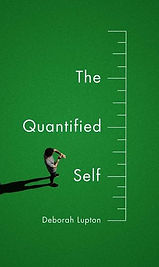ALICE WASS
Exploring Media
Postdigital Body
Entry One
Technology not only collects and generates information about humans, but also technology is changing the practices of selfhood, as seen in neoliberal politics. Technology encourages a selfhood focused on self-tracking culture, through sports watches and mood apps, allowing us to track and monitor our behaviour. Biopolitics see this as ‘soft’ power, where responsibility falls on individuals. This is evident in the current culture of caring for ourselves, holistically. Neoliberalism agrees with this method of self-responsibility and encourages state withdrawal to increase personal growth.
Cultures of embodiment have also changed. During the Industrial Revolution the body was viewed as a machine, now the body has become digitised, meaning it is part of a digital information system. This is based on biometrics, giving us the ability to turn the body into readable text. The increase the ability to self-track via digital scanning technology, is important in medicine and social media. Online health assessments can be done anywhere at anytime, allowing people to monitor their health. This has caused people to view their bodies in terms of binary oppositions, such as: thin/fat, healthy/ill and normal/pathological.
Digitisation of the body has not only changed how individuals treat their body but has also brought a greater understanding of populations. This is achieved through datafication, as our bodies, selves, social life and social institutions are now digitally monitored, creating a huge amount of data. This data is a social and cultural artefact created by human decisions and assumptions. Datafication allows insight into complex human behaviours, feelings, relationships and motivation, by transforming it into readable data. This is used by experts to make assessments about individuals and groups.
Surveillance has been used by authorities to monitor unknowing subjects, examples include CCTV and RFID chips in passports. However, increased digitisation means surveillance is now changing and digital data can be used to construct profiles on individuals, overtly or covertly, checking whether they are dangerous. This is dataveillance, as digital data is collected during interactions on the internet and this generated information is used for surveillance. This raises several issues, for example, it was perceived as wrong when the state used biometric facial recognitions on people, but now this occurs daily with individuals on social media tagging one another in images. This creates issues around privacy, as digitisation collects personal information which is stored and used online. This problem is highlighted on social media sites, where filling in personal information is encouraged and then broadcasted to our contacts, causing the private to become publicised.
Lupton highlights many areas of interest surrounding post digital bodies. The change in society brought about by increased digitisation means that how individuals view their bodies and look after them is dramatically different. This may be regarded as a good thing, as self-monitoring encourages us to look after ourselves. However, the amount of data available on us might concern us, especially as online privacy rules are ambiguous. This could be dangerous for children growing up in a digital age. I wonder how human interaction with technology will continue to develop, and whether our reliance on technology is too great.
Lupton’s ‘New Hybrid Beings’ explores the social, cultural and political theory which affects the understanding and meaning of self-tracking cultures. Key areas include: sociomaterial perspectives, lively data, selfhood, neoliberal politics, cultural dimensions of embodiment, datafication, dataveillance and privacy.
The sociomaterial perspective focuses on the digitisation of society and our social lives as human interaction with technology changes. An example is wearable technology, including smart watches and mobile phones, which have become part of our bodies, are touched and carried and contain personal information.
The issue of technology holding personal information is examined through lively data. A new global economy focusing on digital data sees big data as disruptive and revolutionary, as it generates insight into human behaviour, making data a valuable commodity. This value has increased through the introduction of prosumption, where consumers have become producers of content. An example of data’s value is evident as social media sites are free to join, because the information they collect makes money.

References:
Lupton, D (2017) ‘New hybrid beings’ Theoretical perspective, The Quantified Self, pp.38-63, London: Polity